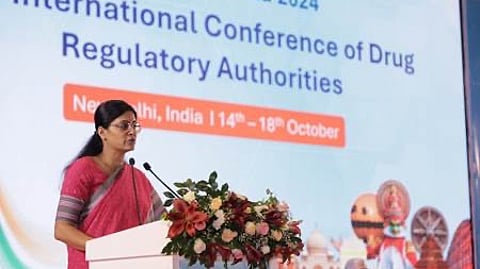

At the 19th International Conference of Drug Regulatory Authorities (ICDRA), Smt. Anupriya Singh Patel, Union Minister of State for Health and Family Welfare, emphasized India’s commitment to strengthening global regulatory frameworks for medicines. The conference, held from October 14th to 18th in India, was hosted by the Central Drugs Standard Control Organization (CDSCO) in collaboration with the World Health Organization (WHO). For the first time, India hosted this significant event, bringing together regulators, policymakers, and health officials from over 200 countries to discuss harmonizing global regulations for safe and effective medicines.
In her address, Smt. Patel highlighted the importance of collaboration, regulatory improvements, and knowledge sharing to ensure accessible, safe medicines for everyone. "ICDRA is crucial in sharing knowledge, building partnerships, and working in harmonisation to ensure safe and effective medicines for everyone," she stated. She underscored how India’s new regulatory frameworks, including the New Drugs and Clinical Trials Rules 2019 and the Medical Device Rules 2017, have aligned India’s research and development efforts with global standards.
ICDRA is crucial in sharing knowledge, building partnerships, and working in harmonisation to ensure safe and effective medicines for everyone,
Smt. Anupriya Singh Patel
These rules have brought about significant changes, especially in promoting scientific and ethical research. The Medical Device Rules 2017, for instance, include risk-based classification, bringing all medical devices under regulatory control through mandatory registration. This has ensured better regulation throughout the lifecycle of medical devices and diagnostics. Smt. Patel mentioned that India’s regulatory processes, both pre- and post-approval, have demonstrated robust control over medical products, positioning India at the forefront of regulatory harmonization globally. The country’s collaboration with international organizations such as the International Medical Device Regulators Forum (IMDRF), International Organization for Standardization (ISO), WHO, and regional networks like SEARN has been instrumental in standardizing regulatory practices.
India's recognition as an affiliate member of IMDRF, along with the acknowledgment of the Indian Pharmacopoeia by the Pharmacopoeial Discussion Group (PDG), was highlighted as a milestone in the harmonization of global regulatory standards. These steps underscore India’s growing role in international regulatory collaboration.
Smt. Patel further discussed the government's efforts to align Indian regulatory standards with WHO’s requirements for good manufacturing practices. The revised Schedule M, which sets standards for biological and investigational products, was a major step in achieving this alignment. Moreover, the adoption of e-governance for regulatory procedures has improved transparency and efficiency in the regulation of medical products in India.
Quality medicines improve the quality of life, human productivity as well as the way of life,
Dr. VK Paul, Member of NITI Aayog
In addition to regulatory advancements, Smt. Patel touched upon India’s focus on antimicrobial resistance (AMR) containment, which is another critical priority for the country. She reaffirmed the government’s strategy in building effective systems for the management and control of AMR.
The Union Minister praised WHO for its efforts in upgrading regulatory systems across the world, especially in promoting partnerships, pharmacovigilance systems, anti-counterfeiting technologies, and the reduction of animal experimentation. These global initiatives, she noted, have fostered a spirit of collaboration and experiential learning among stakeholders. "The way WHO promotes partnership, reliance, experiential learning, pharmacovigilance systems, anticounterfeiting technologies and monitoring systems and reduction in use of animal experimentation need a word of appreciation," she said, further emphasizing India’s commitment to working closely with WHO in these areas.
Dr. VK Paul, a Member of NITI Aayog, also spoke at the event, underscoring the importance of ICDRA in creating a robust regulatory environment for medicines, especially after the COVID-19 pandemic. He praised India’s regulatory system for efficiently licensing eight vaccines during the pandemic through a rigorous process. These vaccines, including mRNA, DNA, and nasal variants, were available at a fraction of the cost compared to other global vaccines.
Dr. Paul remarked on the vital role of quality medicines in improving human life, productivity, and overall well-being. He pointed out that ICDRA 2024 is crucial in its commitment to strengthening the global regulatory environment post-pandemic. He also noted that the future of healthcare will be driven by technological advancements, and India’s digital health initiatives and medical infrastructure place the country at the center of this transformation.
Another important aspect of India’s healthcare landscape, as Dr. Paul mentioned, is the country’s rich traditional medical systems. India has a long history of practicing traditional medicines, and Dr. Paul emphasized the need to mainstream these practices to further improve healthcare outcomes.
Dr. Rajiv Bahl, Secretary of the Department of Health Research and Director-General of the Indian Council of Medical Research (ICMR), highlighted the role of regulators in fostering health research. He pointed out that India developed indigenous diagnostic tests during the first few months of the pandemic at a fraction of the global cost. Similarly, within nine months of the pandemic, India approved its first COVID-19 vaccine.
Dr. Yukiko Nakatani, Assistant Director-General of WHO, noted the crucial role of regulatory systems during the pandemic and congratulated India on retaining its Maturity Level III for vaccine regulation. Ms. Kimberlee Trzeciak, Deputy Commissioner of the US Food and Drug Administration, also emphasized the need for advanced drug manufacturing practices while ensuring global compliance with regulatory standards.
The conference concluded with a call for continued global collaboration and partnership to improve healthcare outcomes worldwide. Smt. Patel encouraged the attendees to work together to create a healthier future, stating, “The ICDRA is not just a conference; it is a chance for us to collaborate, innovate, and support one another in our shared mission for better health for all.”
(Input from various sources)
(Rehash/Yash Kamble/MSM)
